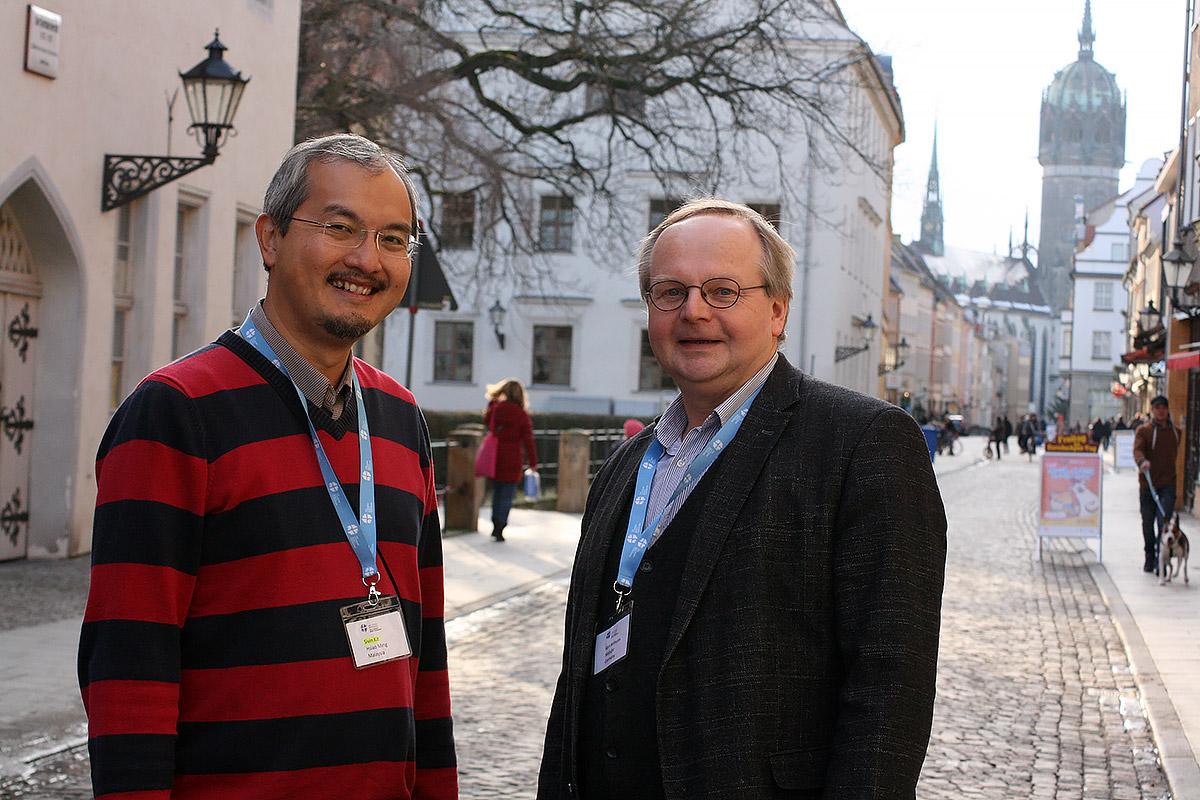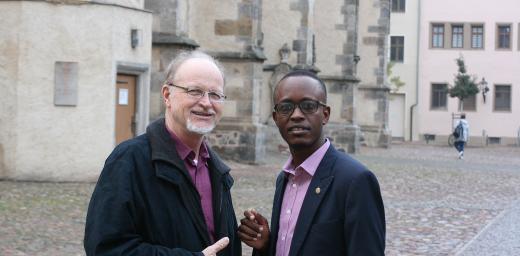Reading the Bible with Luther in different cultural contexts

Prof. Dr Karl-Wilhelm Niebuhr, on the right and Rev. Dr Sivin Kit, at his left, lecturest at the 17th International Theological Seminar, taking place in Wittenberg, Germany. Photo: LWF
Theologians from all regions meet for 17th International Theological Seminar at LWF Center Wittenberg
(LWI) – “Martin Luther’s approach to the Bible follows a long-standing tradition among scholars, but in a number of ways it is unique for his time,” Prof. Dr Karl-Wilhelm Niebuhr, a lecturer at the 17th International Theological Seminar, says.
For two weeks, 20 theologians from all seven regions of the Lutheran World Federation (LWF) have taken the opportunity to study the works of Martin Luther in Wittenberg, close to the places where Martin Luther worked and lived. The great variety of participants and the different backgrounds of the lecturers provide a unique opportunity to discuss different contextual approaches to Lutheran theology.
Lecturers from Asia and Europe
Prof. Dr Niebuhr is lecturing at the seminar titled “Reading the Bible with Luther in our respective contexts” at the LWF Center in Wittenberg from 3 to 17 March.
While Niebuhr is professor for New Testament at the Friedrich-Schiller-University Jena, Germany, his fellow lecturer, Rev. Dr Sivin Kit, is Director of the Centre for Religion and Society in Seremban, Malaysia – a country with a Muslim majority. Rev. Dr Kit has taken a closer look at different contexts in the twenty-first century.
In Prefaces to the New Testament, Luther takes the liberty to criticize several New Testament books, freely puts them in a new order and gives explicit preference to the gospel of John over and above the other three gospels. Having done so, he goes on to explain his reasons in Prefaces.
Prof. Dr Niebuhr draws the conclusion that the Bible does not offer a singular approach to interpretation, a central message of his lectures at the International Theological Seminar over the past week.
“The Bible itself provides for different perspectives on Jesus through the fact that there are four gospels. The different perspectives taken in the gospels open doors for people with diverse contextual and personal approaches to the Bible.”
Common ground and diverse challenges
Rev. Dr Kit explains his approach as one of encouraging participants to more deeply reflect on the meaning of context. “Context has many elements, eg experience, social location, social change or culture.”
Interaction among the participants, who come with their diverse backgrounds, creates awareness of these contexts, and changes their perception thereof.
We want to affirm that everyone – also people coming from non-western cultures – has a contribution they can make to reading the Bible and to reflect on Luther.
“These experiences cannot be made by reading a book,” says Rev. Dr Kit, pointing out one of the key benefits of the seminar. “We want to affirm that everyone – also people coming from non-western cultures – has a contribution they can make to reading the Bible and to reflect on Luther.”
Prof. Dr Niebuhr identifies the fact that all participants are Lutheran theologians as a common point of departure. “There are shared concepts such as the justification by grace that make discussions at a global level much easier,” he says.
He draws this conclusion having lectured at three seminars at the LWF Center in Wittenberg and by becoming familiar with the LWF through his role in several working groups, including that responsible for the publication of “Singing the Songs of the Foreign Lands – Psalms in Contemporary Lutheran Interpretation” in 2014.
Better understanding of key statements
Since 2009, the LWF Center in Wittenberg has offered two seminars each year for theologians from member churches around the world. They are invited to Wittenberg for two weeks to work on issues of Lutheran theology with professors from universities in Germany and abroad.
The aims are to instill better understanding of the key statements in Luther's writings, to appreciate the circumstances and relationships in which Luther lived, and to relate Luther's insights to the world in which the participants live. The next seminar is planned for November.



